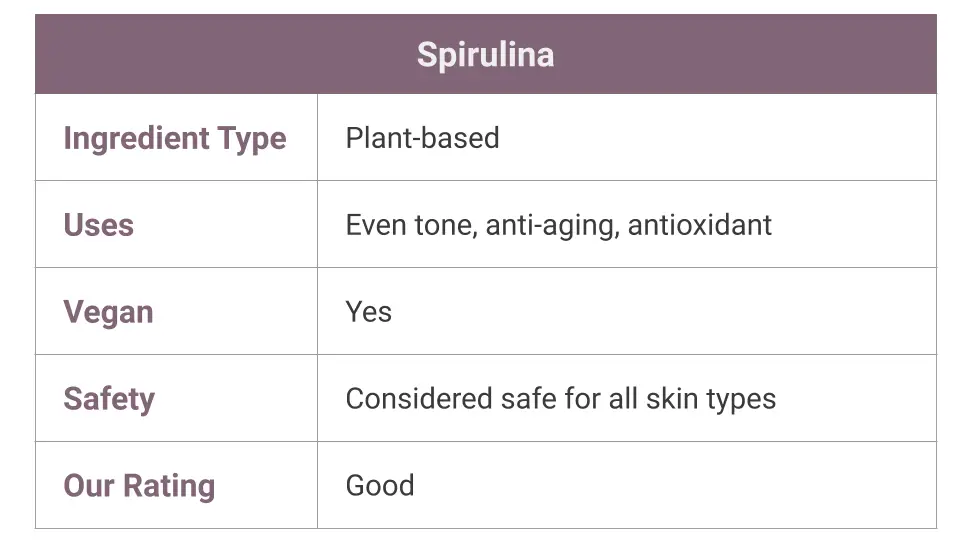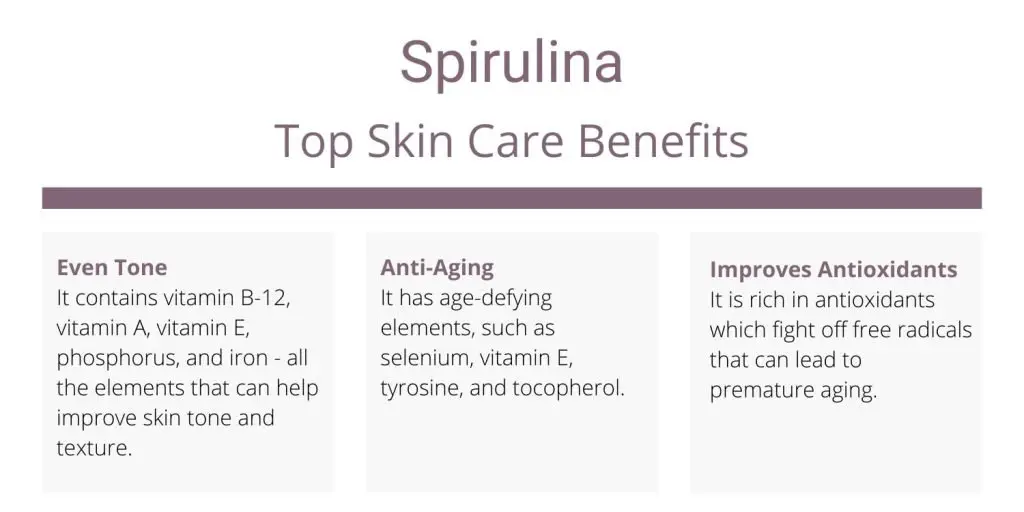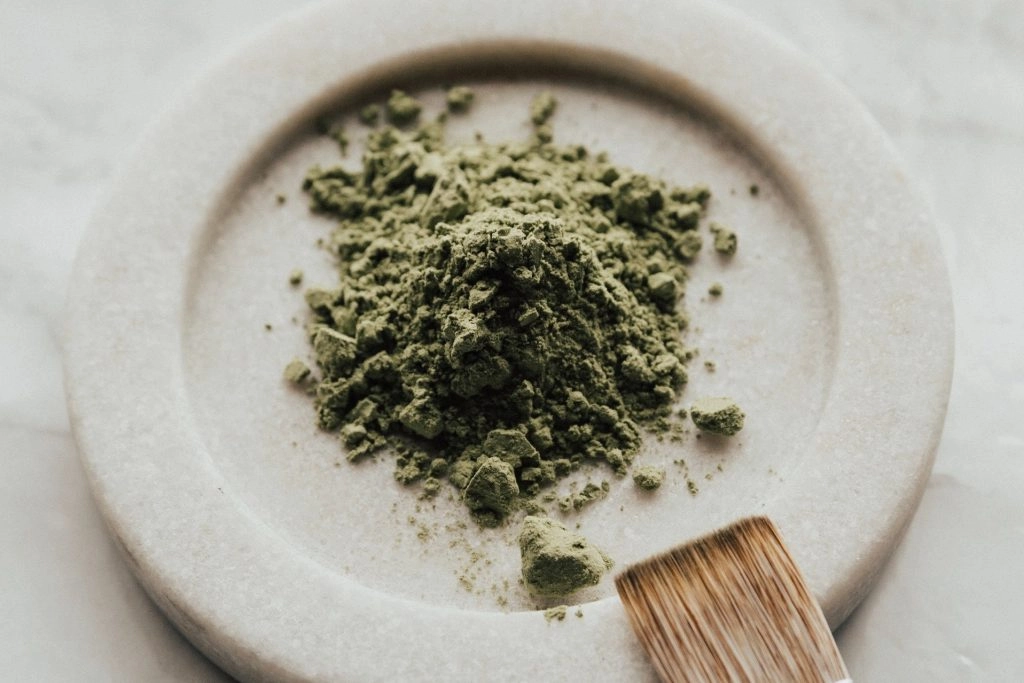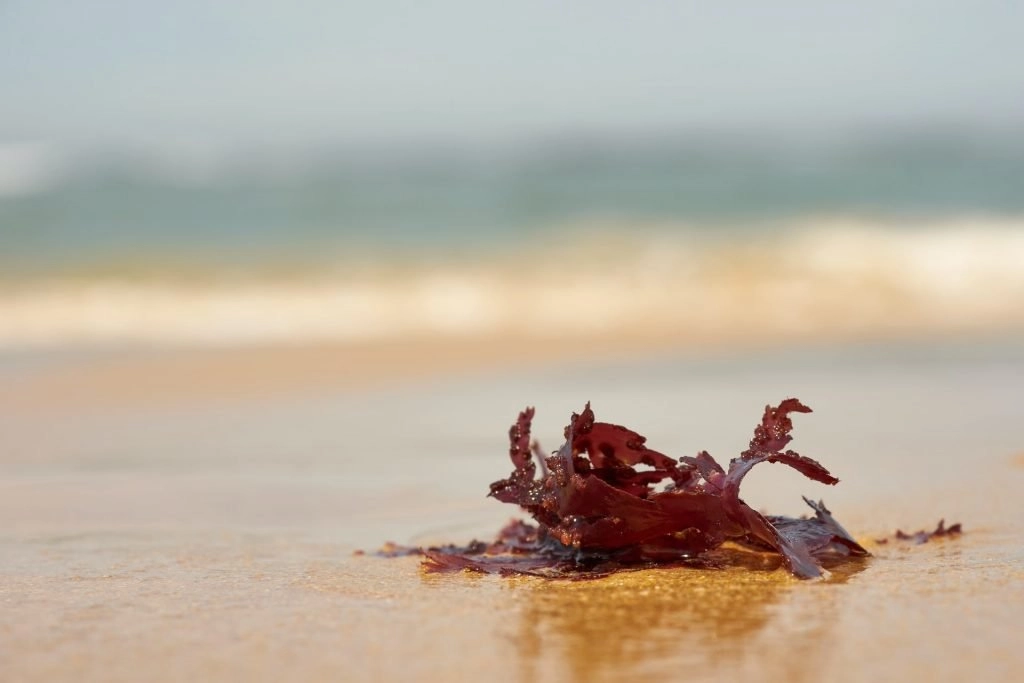Photo above by Daria Shevtsova from Pexels
This post may contain affiliate links. Read the full disclosure here
While this green powder (from seaweed) is widely-known as a dietary supplement ingredient, it also has a place in skincare. You can still enjoy the benefits of spirulina without the chalky, earthy flavor.

What Is Spirulina?
Spirulina is cyanobacteria or a type of blue-green algae containing a number of nutrients, such as Vitamin E, beta-carotene, B vitamins, fatty, and amino acids. These are all great nutrients for the skin.
It is also often called “superfood” or “super seaweed”. Spirulina is also loaded with antioxidants and is a popular ingredient in health supplements and protein powders. In other words, you can even consume this ingredient.
It you are fond of spirulina, you may also like purslane as a skincare ingredient. It’s sort of like the “super weed” in skincare products.
Learn more about the different types of seaweed and its benefits here.
Spirulina Skin Benefits
Spirulina offers several benefits to the skin; it can help decrease inflammation, improve tone, encourage cell turnover, and more.
- Even skin tone and texture – it contains vitamin B-12, vitamin A, vitamin E, phosphorus, and iron – all the elements that are vital for the health of the skin. Using skincare products containing spirulina or preparing masks with this ingredient makes your skin look more toned, vital, and youthful. In addition, it is also a perfect treatment for flabby skin by removing the metabolic waste bodies from the body and strengthening it as a whole.
- Reduce appearance of dark circles – Spirulina has proven to be effective in treating dark circles and managing dry eye symptoms. With the help of its detoxifying features, it gives the eyes new power and energy by removing dark circles under eyes.
- Anti-aging effects – It has age-defying elements, such as selenium, vitamin E, tyrosine, and tocopherol. It also has antioxidants that fight-off free radicals responsible for premature aging.
- Fight Free Radicals – Spirulina has special elements that help the skin to heal faster. It removes free radicals from the skin, which increases its metabolism. It also prevents overgrowth of candida (a common cause of fungal infections in humans) that can lead to acne breakouts.
- Reducing dark spots and discolorations. Spirulina is rich in vitamins, protein, iron, and chlorophyll, which helps to reduce dark spots on the skin and discolorations and make skin tone look better and healthier.
- Antimicrobial – It is a natural antimicrobial which can be helpful in fighting off the bacteria that cause acne.

There are different ways to use spirulina for your skin. You can use spirulina powder to prepare homemade face masks. There are also plenty of spirulina induced products available in the market, including scrubs, sheet masks, and others. If you use a face mask with spirulina, do not forget to apply a moisturizer after to keep your skin hydrated and smooth.
Is Spirulina Vegan?
Yes, it is. Spirulina is a microscopic plant that does not contain or come into contact with any animal byproducts or animals.
Safety and Concerns
Although spirulina has many benefits, you may wonder if there are any side effects you should know about. Here is the list of potential downsides and drawbacks of using spirulina – especially for people with certain health issues.
- May be contaminated with toxins. If spirulina is harvested in the wild, there is risk of contamination. If it grows in a body of water polluted with bacteria, heavy metals, or microcystins (also known as harmful particles), then the algae may harbor toxins. When used in high amounts, microcystins can damage the skin. Spirulina that grows in controlled environments is much safer because scientists use the techniques to remove the toxins from spirulina.
- May cause allergic reactions. Those people who are allergic to something are more likely to be allergic to spirulina than people without any allergies. To be safe, it is recommended to avoid using spirulina if you have an allergy. Also, if you are using spirulina for the first time, test it on a small area of your skin first before applying to the face.
In order to avoid any side effects, consider consulting your esthetician or dermatologist. It is also important to remember that even certified types of spirulina are not always completely free of toxins and dangerous compounds. To reduce the risk of contamination and protect yourself, you should purchase spirulina from trusted brands only.




